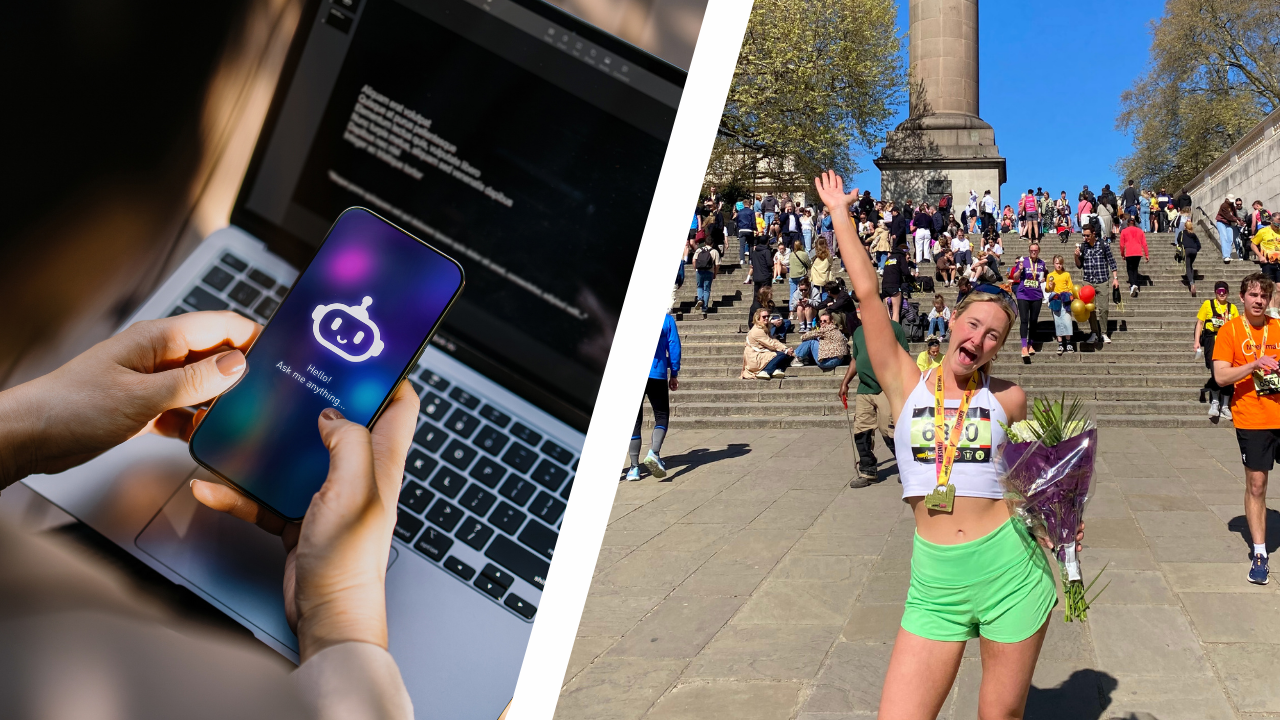I’m the friend in the group who rolls her eyes when someone says they used a chatbot to plan our next girls’ holiday, find a dinner recipe, or write a speech. I’ve always defended doing things the old-fashioned way and using a bit of imagination. But I have to eat my words.
I turned to ChatGPT to build a race day strategy for the London Landmarks Half Marathon.So, what led me to climb down from my high horse?I’m currently training for a full marathon using Coopah, one of the best running apps for personalized race plans. It builds a tailored plan around your main goal race, but also lets you add secondary 'B events' along the way, like the half marathon I had coming up, and adjusts your training accordingly.

Unfortunately, the London Landmarks Half fell a little too close to my marathon and missed the cut-off to be included as a B event. That meant I had no guidance on how to pace it.I’m not exactly known for my maths skills (hence the career in writing), and I didn’t fancy trying to work out pacing splits myself.
So, I opened up ChatGPT and asked it to build a race day strategy for me. Here’s what happened.1.
I fed ChatGPT as much relevant information as I couldI was lying in bed, full of pasta and pre-race nerves, the night before my half marathon when I decided to ask ChatGPT for help. My full marathon was three weeks away. Up until this point, I’d been training hard (four times a week for 14 weeks), but I’d just come off a rough week with a cold and a failed long run.
I needed a bit of a boost from this half marathon, and a race day strategy was going to fill me with some confidence. I figured: why not let the robots decide how fast I should run?I gave it everything, my marathon goal, the stage of my current training plan, any training hiccups and even the fact I was recovering from a nasty cold. To its credit, ChatGPT took it all in it's stride and came back with a recommended target time for my half marathon, the pacing breakdown to get there, and even a backup plan in case I still felt off from the cold.
It was surprisingly reassuring. Almost coach-like. I was weirdly into it.
A well-paced plan beats vibes-based racingThe more questions I asked ChatGPT, What if I want to aim for a faster time? Can you structure it so I can aim for negative splits? How do I program this race plan into my Garmin? The more detailed and dialled-in the responses became.I ended up with a full pacing plan baked into my best Garmin watch, that on the day helped me ease into the race, gradually pick up the pace, and avoid the common race day mistake of going out too fast and clinging on for dear life.(Image credit: Jessica Downey)With my watch programmed to keep me in check and my brain freed from mid-race maths, I actually got to enjoy the atmosphere and take in the many wonders of the London Landmarks Half Marathon, from the London Eye and St Paul’s Cathedral to Big Ben, Nelson’s Column and the Shard.
Even though I felt good, I stayed a little skeptical. Surely an AI-generated pacing plan wasn’t that trustworthy? But somehow, it was on this occasion. I crossed the line in 1:37, shaving 14 minutes off my previous PB.
3. It worked — but the robot didn’t do the running(Image credit: London Landmarks Half Marathon)While ChatGPT gave me the race day strategy, it wasn’t the one doing the four runs a week for three months. It didn’t fuel me, hydrate me, or lace up a pair of the best carbon-plated running shoes on the day.
The flat course, friendly crowds, and well-organised race also helped.Still, having that structured plan in place made a notable difference. It quieted the nerves, gave me a clear focus, and meant I didn’t waste energy mid-race trying to do maths while sweating through a gel wrapper.
The VerdictWould I recommend letting ChatGPT pace your race? Cautiously, yes, but with a big asterisk.It’s not a coach, and it’s definitely not a guaranteed route to a PR. The quality of the advice depends entirely on the information you feed it, and there’s always a risk it could misconstrue the data or steer you off course.
If you’re going to use AI for something like this, treat it as a sounding board, not a substitute for expert advice. Be specific and honest about your training, health, and goals. Cross-reference the plan with trusted sources or your training app.
And most importantly, don’t ignore how your body feels on the day, no chatbot can predict that better than you can.More from Tom's GuideI tried a marathon manifestation and meditation session — here’s what happenedI put the On Performance Flex Bra through marathon training — here's who should (and shouldn't) buy itPhysio says runners need these 3 calf strength variations in their training — here’s why I’m finally listening.
Technology

I asked ChatGPT to build me a race strategy for a half-marathon — and I was shocked at how well it went

From keyboard to finish line — how ChatGPT shaped my half-marathon strategy.















